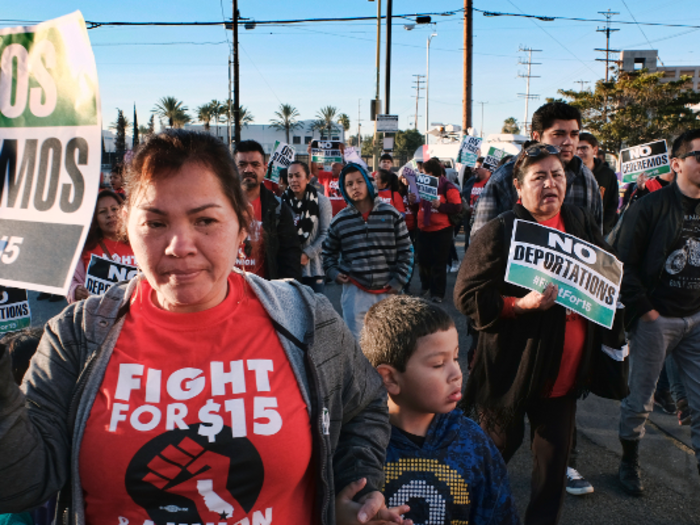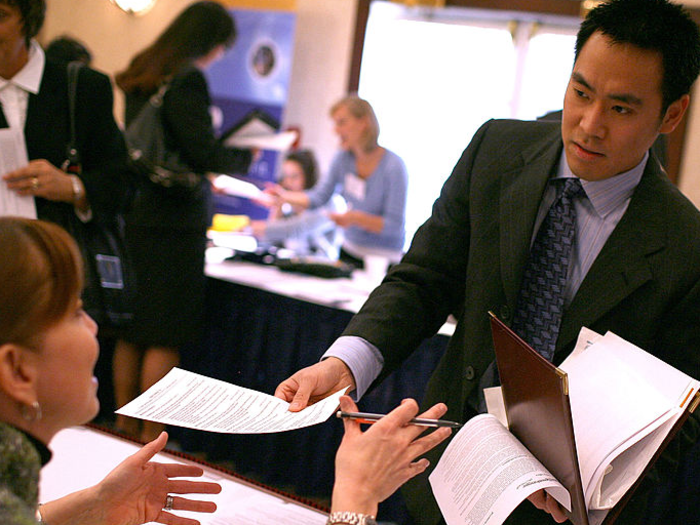- Home
- slideshows
- miscellaneous
- 7 reasons why your salary might not be going up, even though the economy is doing great
7 reasons why your salary might not be going up, even though the economy is doing great
Productivity gains have been minimal

Companies are increasing their spending on benefits

Employers have been increasing their spending on benefits — particularly health insurance, as Pew Research Center reported. There's also retirement-account contributions, transit subsidies, tuition reimbursement, and the like to take into consideration.
Wage and salary costs have grown 5.3% costs since 2001, adjusted for inflation, while benefit costs are up 22.5%.
While this is, as Shambaugh said, "a pretty small part" of the full picture, it may be keeping down workers' pay in these past few years of economic growth.
Corporations are directing more of their money to shareholders and executives, not everyday workers

For decades, corporate profits and employee wages grew at a similar pace. But since 2002 or so, corporate profits have surged past worker compensation.
As The New York Times reported in July, "Corporate profits have rarely swept up a bigger share of the nation’s wealth, and workers have rarely shared a smaller one."
Jared Bernstein, an economic adviser to former Vice President Joseph R. Biden Jr., told the Times that workers would have significantly more cash in their pockets had their share of the country's wealth not shrunk so much. In total, that amounts to about $532 billion, or $3,400 per person per year.
Meanwhile, the majority of corporate profits have been going to corporate investors and chief executives, whose compensation is often based on stocks, or foreign mergers and acquisitions.
Tons of low-wage workers are finally re-entering the workforce

From a technical standpoint, Shambaugh said wage growth numbers may appear dismal simply because tons of low-wage workers are only just now recovering from the Recession. They're now re-joining the workforce and lowering the median wage.
"If you keep adding people who are low-wage workers, it will bring down the whole wage series," Shambaugh said.
But that doesn't explain why wage growth has been low in the long-run.
Unemployment isn't as low as we think it is

Tons of job openings and not a lot of workers available to fill them ostensibly cause wages to go up. Employers raise wages in order to encourage their employees to stick around.
However, the unemployment rate of 3.9% only accounts for those who are seeking work. So, Shierholz said, there are many jobless people out there who aren’t looking for work. That means that the job market is not as tight as it seems.
Fewer working-age adults are participating in the labor force or job search than before the recession. Part of the reason is that wages are too low to incentivize people to work; they might find it more economically viable to care for children or stay home if they have health problems.
"The wages are so low that it's hard to draw people into the labor force," Shambaugh said.
Membership in unions has declined, which means fewer wage gains to those both in and out of unions

Following World War II, one in three workers belonged to a union, according to Rosenfeld, who wrote "What Unions No Longer Do." That's since fallen to one in 10.
The people who lose out on the decline of unions aren't just union workers themselves, said Rosenfeld. "Union spillover effects" meant that non-union workers also enjoyed wage boosts because their employers would peg pay to the union rates so that their workers didn't unionize.
Non-managerial construction, transportation, and manufacturing workers were most likely to be unionized, said Rosenfeld.
Shareholders don't want companies to raise wages

When American Airlines announced last year they would be giving raises to pilots and flight attendants, the company's stock tanked by 5.2% in one day.
"This is frustrating. Labor is being paid first again. Shareholders get leftovers," Citi analyst Kevin Crissey wrote in a note to clients, the Los Angeles Times reported.
In fact, airlines are facing a massive pilot shortage right now because labor hasn't been getting paid first. Pilots' median earnings decreased by 9.5% from 2000 to 2012, according to a Government Accountability Office report.
Rosenfeld said that market moves like that have helped keep wages low.
"There is this idea that shareholders are the one set of stakeholders that deserve the largest share of a company's profits, rather than balancing the need of other stakeholders like workers or consumers," Rosenfeld said.
In summary, economists say workers have lost much of their power

Elevating shareholders over the workers, the reduced presence of unions, and a general decline in labor standards have all taken power away from the workers.
"The tight labor market shifts bargaining power to workers, but the other things like labor unions and strong labor standards have taken a huge hit over the past four decades," Shierholz said.
Now, 3.9% unemployment isn't enough to drive up wages.
"Given that those other things that have given bargaining power to workers have eroded so dramatically, you need a tighter and tighter labor market to spur meaningful wage growth," she said.
Popular Right Now
Popular Keywords
Advertisement